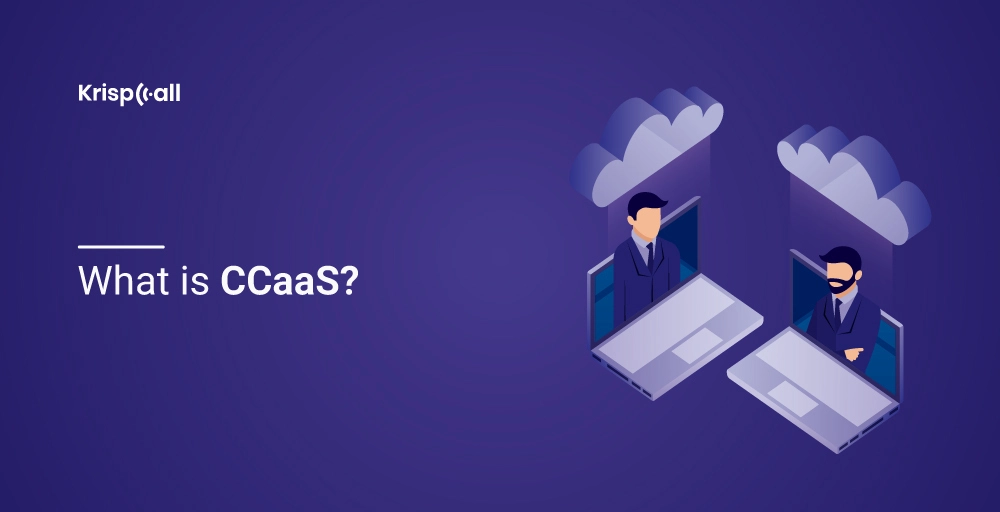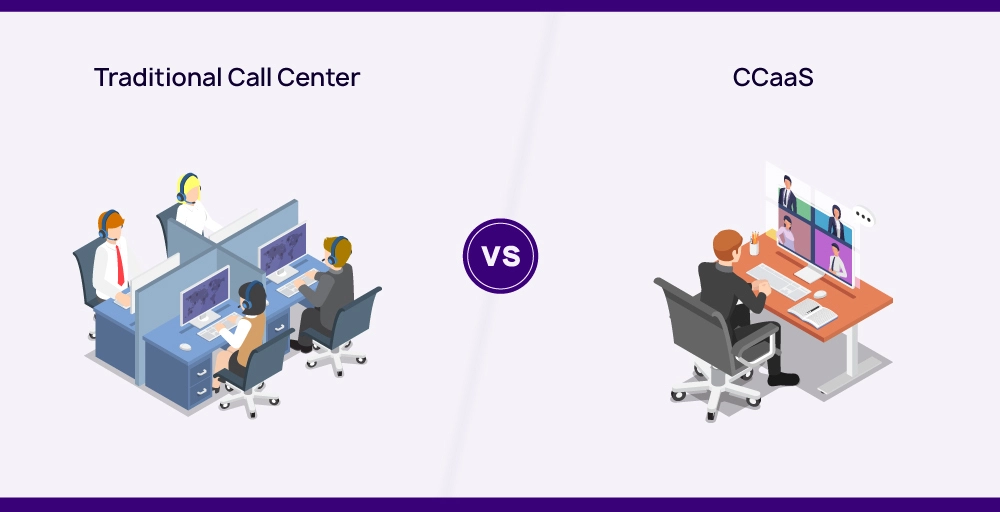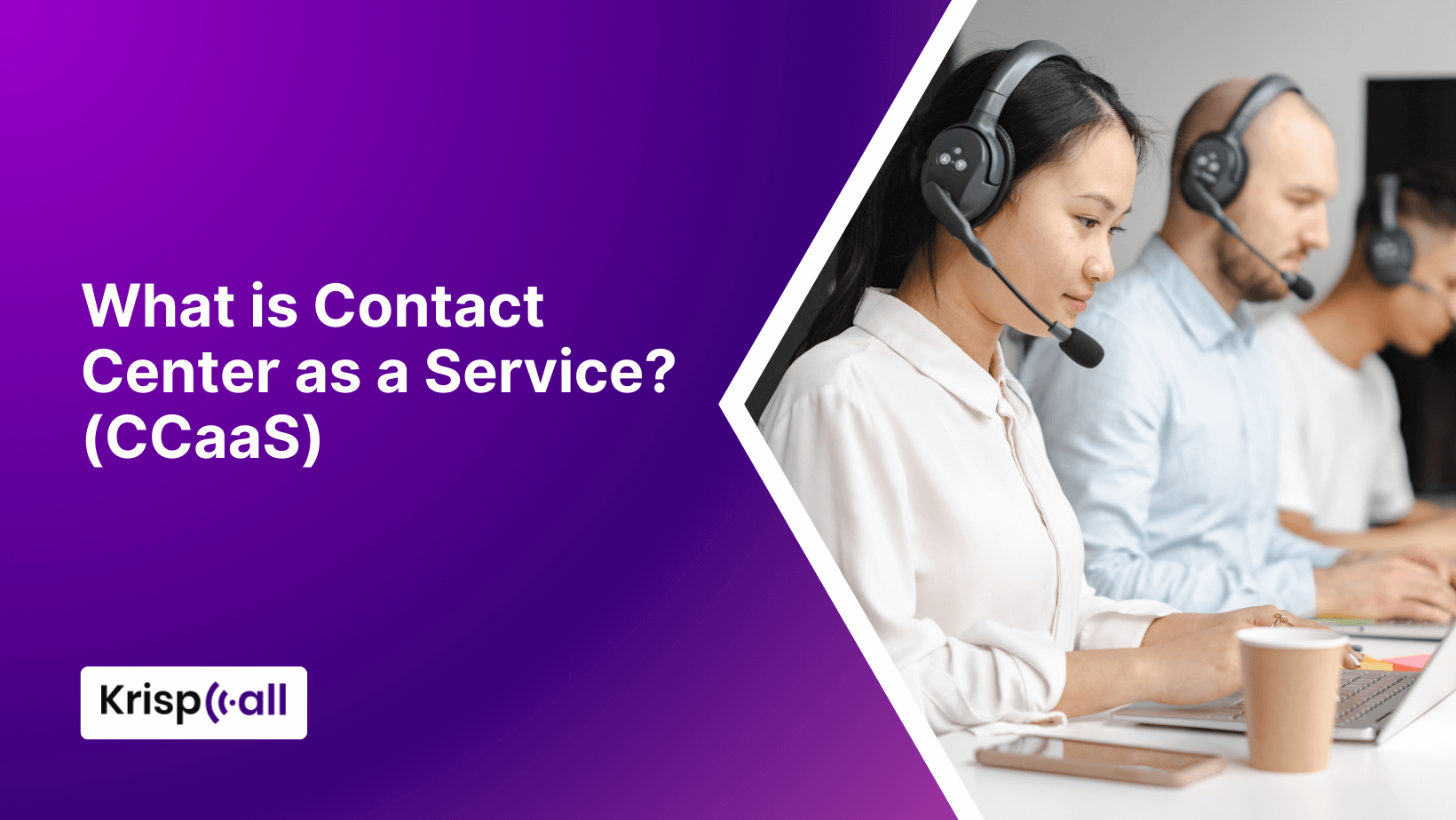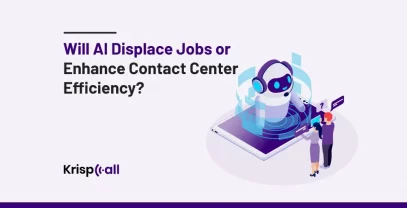Customers expect businesses to be easily reachable, but regular call centers often struggle to keep pace due to limitations such as inflexibility, high costs💰, and complexity.
Consequently, if customers encounter difficulties reaching your business, they might choose to go to other companies instead.
Contact Center as a Service is like a modern solution to this problem. It is a cost-effective and flexible cloud-based☁️ alternative to traditional contact centers, allowing businesses to seamlessly manage customer interactions across various platforms.
In this guide, we’ll explore CCaaS in more detail and show you how it can help improve your customer experience while optimizing your resources.
🔑 KEY HIGHLIGHTS
- The key features of CCaaS include omnichannel communication, automatic call distribution, interactive voice response, intelligent virtual agents, and CRM integration.
- The benefits of CCaaS include cost savings, scalability, self-service options, real-time analytics, and robust security.
- To choose the best CCaaS platform, assess your business needs, define key features, evaluate scalability, explore integration capabilities, consider pricing and flexibility, compare providers, and gather recommendations from industry peers and trusted advisors.
What is CCaaS?
The contact center as a service (CCaaS) is a software deployment approach that allows companies to purchase only the technology they require. It’s often managed by a vendor, reducing IT, integration, and support costs.

With CCaaS, businesses can handle customer inquiries across various channels from one platform, such as phone calls📞, emails, and social media messages. CCaaS is ideal for contact centers because it can scale up or down as operations change.
The key features of CCaaS include:
- Omnichannel Communication: Improve customer experience by easily switching between channels during interaction, maintaining continuity and context.
- Automatic Call Distribution (ACD): Intelligently route calls to the most suitable agent based on skills, priority, or availability, reducing wait times and improving first-call resolution.
- Interactive voice response (IVR): Use self-service options through automated phone menus to deflect simple inquiries and improve customer satisfaction.
- Intelligent Virtual Agents (IVAs): Handle customer inquiries around the clock, providing immediate support and deflecting non-critical issues from live agents.
- CRM integration: By analyzing combined CCaaS and CRM data, gain valuable insights into customer behavior, identify trends, and make informed decisions about service improvements and marketing strategies.
Therefore, Contact Center as a Service simplifies customer inquiries, cuts IT reliance, scales with operations, and boosts efficiency with features like omnichannel communication and CRM integration.
Benefits of CCaaS
Companies are choosing CCaaS for several good reasons. A few of them include:
1. Cost Savings
CCaaS helps businesses save money by avoiding expensive hardware and software costs and ongoing maintenance. It offers a cost-effective solution for businesses, helping them optimize expenses while accessing the necessary tools and support for their contact center operations.
With a flexible pay-as-you-go subscription, companies can adjust costs based on their needs, paying only for what they use.
This means that businesses can allocate their resources more efficiently, focusing only on the services that are essential to their operations.
2. Scalability and Flexibility
In today’s fast-paced business world, flexibility is crucial for success. CCaaS offers the adaptability businesses need to thrive in an ever-changing environment.
With CCaaS, you can easily adjust seats and features as needed, ensuring you can meet shifting customer demands and business requirements.
This helps companies grow💹 quickly during busy seasons or unexpected growth without needing to invest a lot of money upfront.
3. Ability to Self-Serve
CCaaS platforms offer automated self-service options, allowing customers to get instant answers to their questions.
Customers benefit from swift answers to their inquiries, bypassing the need to contact a support center or endure wait times.
This approach reduces call volumes and eases the burden on customer service agents, decreasing average wait times across the contact center.
4. Real-time Analytics and Reporting
Real-time analytics and reporting are invaluable benefits of CCaaS platforms.
It provides immediate insights into how your contact center is performing and how customers are interacting with your business.
This allows businesses to generate comprehensive reports and analyses, providing deeper insights into trends, patterns, and areas for improvement over time.
5. Security and Compliance
CCaaS platforms prioritize security and compliance, safeguarding customer data and ensuring uninterrupted service.
Through heavy investment in data security and redundancy, providers offer high reliability and uptime, ensuring uninterrupted operations, even during challenges like office moves or severe weather.
This gives businesses peace of mind🤗, knowing their operations are secure and compliant with regulations.
Evolution of Call Center Software: Understanding the Distinctions Between Traditional Call Centers and CCaaS
Call centers and contact centers have distinct roles in customer support.

Traditional Call Centers:
- It uses physical setups at company premises, which costs a lot to set up and maintain.
- It handles voice calls and lacks other communication options like email or chat.
- Expanding operations is hard and needs more equipment.
- Agents usually work from fixed offices, limiting flexibility.
- Keeping data safe in this setup is tough.
CCaaS (Contact Center as a Service):
- Operates entirely online, saving money on equipment.
- Supports different communication channels like phone, email, and chat for a smooth experience.
- It’s easy to scale up or down based on needs.
- Agents can work from anywhere with the internet, giving more flexibility.
- Offers strong security features to protect data.
CCaaS offers significant advantages over traditional call centers, including reduced costs, scalability, support for multiple communication channels, remote work capabilities for agents, and enhanced security measures. These benefits make CCaaS an ideal solution for businesses seeking efficient and secure customer support operations.
How To Choose The Best CCaaS Platform
Consider the following steps when selecting✔️ the best CCaaS platform:
1. Assess Your Business Needs
Begin by thoroughly evaluating your customer service requirements. Consider factors such as the volume of incoming calls, the need for omnichannel support, and any specific features crucial to your operations.
2. Define Key Features
Once you’ve identified your needs, outline the key features essential for your CCaaS platform. This could include automatic call distribution (ACD), interactive voice response (IVR), call recording, analytics, and integrations with other tools.
3. Evaluate Scalability
Ensure the CCaaS platform can easily scale alongside your business growth. Look for solutions that offer flexible pricing plans and can accommodate fluctuations in call volume without compromising performance.
4. Explore Integration Capabilities
Check the platform’s compatibility with your existing systems and tools, such as CRM software, helpdesk solutions, and communication channels like email and chat. Seamless integration ensures efficient workflow and data synchronization.
5. Consider Pricing and Flexibility
Consider the pricing structure of different CCaaS providers and choose one that aligns with your budget. Opt for platforms that offer customizable plans and the flexibility to add or remove features as your business needs evolve.
6. Compare CCaaS Providers
Conduct thorough research on various CCaaS providers, considering factors such as reputation, reliability, customer support, and industry experience. Request demos and evaluate each platform’s user interface and functionality.
7. Read Reviews and Gather Recommendations
Read reviews and testimonials from other businesses currently using the CCaaS platforms you’re considering. Seek recommendations from industry peers and consult with trusted advisors to gain insights into the platform’s performance and reliability.
Wrapping Up…
Contact Center as a Solution is a cost-effective🤑, scalable, and feature-rich solution for managing customer interactions.
From reducing costs and streamlining operations to offering omnichannel support and real-time insights, CCaaS equips businesses to meet ever-evolving customer demands and build stronger relationships.
If you’re looking🧐 to elevate your customer service and gain a competitive edge, CCaaS is a powerful tool to seriously consider.
FAQ
What does CCaaS mean?
CCaaS stands for Contact Center as a Service. It refers to a cloud-based solution that provides businesses with tools and functionalities to manage customer interactions effectively across various channels such as phone, email, chat, and social media.
What is the difference between UCaaS and CCaaS?
The main difference between UCaaS (Unified Communications as a Service) and CCaaS (Contact Center as a Service) lies in their focus and functionality. UCaaS primarily focuses on providing unified communication tools such as voice calling, video conferencing, instant messaging, and collaboration platforms for internal communication within an organization. On the other hand, CCaaS specifically caters to managing customer interactions, including features like call routing, IVR (Interactive Voice Response), CRM (Customer Relationship Management) integration, analytics, and reporting.
What is a CCAs in technology?
In technology, CCAs (Contact Center Agents) are individuals employed by businesses to handle incoming and outgoing customer communications. They use various tools and software provided by CCaaS platforms to effectively manage customer interactions and provide satisfactory resolutions to customer queries and issues.
How does CCaaS improve contact center performance?
CCaaS enhances contact center performance by providing features like automatic call distribution, interactive voice response, and real-time analytics. These tools streamline operations, reduce wait times, and improve overall efficiency.
How does CCaaS impact contact center employees?
CCaaS empowers contact center employees by providing them with user-friendly interfaces, advanced tools, and robotic process automation capabilities, thus enhancing their productivity and job satisfaction.
How does CCaaS help in measuring customer satisfaction?
CCaaS platforms often integrate customer satisfaction surveys and analytics tools to monitor and evaluate the customer journey, enabling businesses to make data-driven decisions.





